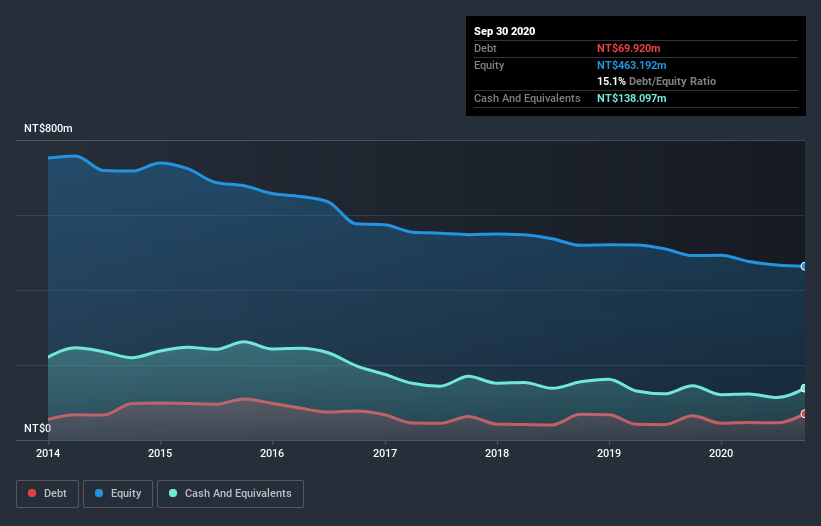David Iben put it well when he said, 'Volatility is not a risk we care about. What we care about is avoiding the permanent loss of capital.' So it might be obvious that you need to consider debt, when you think about how risky any given stock is, because too much debt can sink a company. We can see that Tittot Company Limited (GTSM:9949) does use debt in its business. But the real question is whether this debt is making the company risky.
When Is Debt Dangerous?
Debt is a tool to help businesses grow, but if a business is incapable of paying off its lenders, then it exists at their mercy. If things get really bad, the lenders can take control of the business. While that is not too common, we often do see indebted companies permanently diluting shareholders because lenders force them to raise capital at a distressed price. By replacing dilution, though, debt can be an extremely good tool for businesses that need capital to invest in growth at high rates of return. The first thing to do when considering how much debt a business uses is to look at its cash and debt together.
See our latest analysis for Tittot
What Is Tittot's Net Debt?
The image below, which you can click on for greater detail, shows that at September 2020 Tittot had debt of NT$69.8m, up from NT$64.4m in one year. However, it does have NT$138.1m in cash offsetting this, leading to net cash of NT$68.3m.

How Strong Is Tittot's Balance Sheet?
We can see from the most recent balance sheet that Tittot had liabilities of NT$77.2m falling due within a year, and liabilities of NT$34.6m due beyond that. Offsetting these obligations, it had cash of NT$138.1m as well as receivables valued at NT$15.7m due within 12 months. So it can boast NT$42.0m more liquid assets than total liabilities.
This short term liquidity is a sign that Tittot could probably pay off its debt with ease, as its balance sheet is far from stretched. Simply put, the fact that Tittot has more cash than debt is arguably a good indication that it can manage its debt safely. The balance sheet is clearly the area to focus on when you are analysing debt. But you can't view debt in total isolation; since Tittot will need earnings to service that debt. So if you're keen to discover more about its earnings, it might be worth checking out this graph of its long term earnings trend.
In the last year Tittot had a loss before interest and tax, and actually shrunk its revenue by 19%, to NT$202m. We would much prefer see growth.
So How Risky Is Tittot?
We have no doubt that loss making companies are, in general, riskier than profitable ones. And we do note that Tittot had an earnings before interest and tax (EBIT) loss, over the last year. And over the same period it saw negative free cash outflow of NT$9.0m and booked a NT$25m accounting loss. While this does make the company a bit risky, it's important to remember it has net cash of NT$68.3m. That means it could keep spending at its current rate for more than two years. Even though its balance sheet seems sufficiently liquid, debt always makes us a little nervous if a company doesn't produce free cash flow regularly. When analysing debt levels, the balance sheet is the obvious place to start. But ultimately, every company can contain risks that exist outside of the balance sheet. Be aware that Tittot is showing 1 warning sign in our investment analysis , you should know about...
If you're interested in investing in businesses that can grow profits without the burden of debt, then check out this free list of growing businesses that have net cash on the balance sheet.
If you decide to trade Tittot, use the lowest-cost* platform that is rated #1 Overall by Barron’s, Interactive Brokers. Trade stocks, options, futures, forex, bonds and funds on 135 markets, all from a single integrated account. Promoted
Valuation is complex, but we're here to simplify it.
Discover if Tittot might be undervalued or overvalued with our detailed analysis, featuring fair value estimates, potential risks, dividends, insider trades, and its financial condition.
Access Free AnalysisThis article by Simply Wall St is general in nature. It does not constitute a recommendation to buy or sell any stock, and does not take account of your objectives, or your financial situation. We aim to bring you long-term focused analysis driven by fundamental data. Note that our analysis may not factor in the latest price-sensitive company announcements or qualitative material. Simply Wall St has no position in any stocks mentioned.
*Interactive Brokers Rated Lowest Cost Broker by StockBrokers.com Annual Online Review 2020
Have feedback on this article? Concerned about the content? Get in touch with us directly. Alternatively, email editorial-team (at) simplywallst.com.
About TPEX:9949
Flawless balance sheet with slight risk.
Market Insights
Community Narratives



